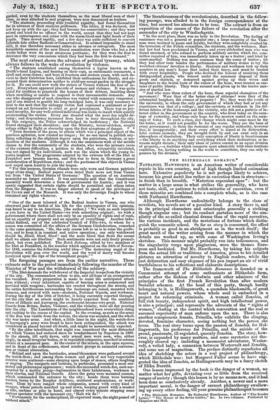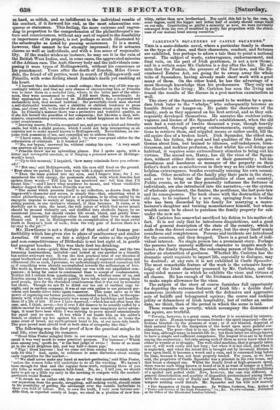THE BLITHEDALE ROMANCE. * NATHANIEL HAWTHORNE is an American writer of
considerable repute in his own country, and of high though limited estimation here. Extensive popularity he is not perhaps likely to achieve, because his great merit lies rather in execution than in structure— in finish than in breadth. " Materiem superabat opus " : but the matter in a large sense is what strikes the generality, who have not taste, skill, or patience to relish minutiae of execution, even if those minutiae are combined into a complete whole, as is the case with Nathaniel Hawthorne.
Although Hawthorne undoubtedly belongs to the class of novelists, his novels are of a peculiar kind. A story there is, and in its principal characters and catastrophe generally a striking though singular one • but its conduct partakes more of the sim- plicity of the so-called classical drama than of the rapid narrative, the various incidents, and the mutations of fortune which distin- guish the romantic school. So far as story is concerned, the effect is probably as good in an abridgment as in the work itself ; the great merit of the writer arising from the manner in which the details are worked up, as with some of Washington Irving's sketches. This manner might probably run into tediousness, and the singularity verge upon plagiarism, were the themes Euro- pean and hacknied. But Mr. Hawthorne, by taking his subjects from the actual life or traditions of America, gives to his detailed pictures an attraction of novelty to English readers, while the just delineation and easy elegance of his pen impart an air of vivid truthfulness to his reflections and elaborate descriptions.
The framework of The Blithedale Romance is founded on a Communist attempt of some enthusiasts at Blithedale farm, rather after the fashion of Godwin and other admirers of the principles of the first French Revolution than after modern Socialist schemes. At the head of this party, though hardly belonging to it, is Hollingsworth, a quondam blacksmith, of great heart and natural powers, whose whole soul is embarked in a project for reforming criminals. A woman called Zenobia, of full rich beauty, independent spirit, and high intellectual power, is also a principal; and represents the advocate of the " rights of women," chafing. at the control which convention and the real or assumed superiority of man enforce upon the sex. There is also another conspicuous female, Priscilla, who exhibits the clinging, devoted, feminine character, seeing nothing but the person she loves. The real story turns upon the passion of Zenobia for Hol- lingsworth, his preference for Priscilla, and the suicide of the proud, passionate, ill-regulated, queenly. Zenobia. The story, how- ever, is expanded by many matters, and some mysteries not tho- roughly cleared up; including a mesmerist adventurer, Wester- velt, a veiled lady, a connexion between Westervelt and Zenobia, and some use of magnetism. The preface distinctly repudiates all idea of sketching the actors in a real project of philanthropy, which Blithedale was : but Maret Fuller seems to have sug gested the idea of Zenobia, as Hog.sworth may be a fancy sketch of Elihu Burritt.
One lesson impressed by the book is the danger of a woman, no matter what her gifts, deviating ever so little from the received usages of society; though this lesson is by no means new, and it had been done as conclusively already. Another, a newer and a more important moral, is ther of earnest philanthropy swallow-
ing up every other feeling, genuine philanthropist becomes
• The Blithedale Romance. By Nathaniel Hawthorne, Author of " The Scarlet Letter," " The House of the Seven Gables," &c. In two volumes. Published by Chapman and Hall.
as hard, as selfish, and as indifferent to the individual results of his conduct, if it forward his end, as the most adamantine con- queror or statesman. This feeling, the more extreme and engros- , sing in proportion to the comprehension of the philanthropist's na- ture and consciousness, without any sort of regard to the feasibility I or importance of its project, is not perhaps so much illustrated by the catastrophe as noted by passing occurrences. It is a moral, however, that cannot be too strongly impressed; for it actuates classes as well as individuals, and with a less sense of responsibi- lity. If the reader wishes an instance, he may see it in the ruin of the British West Indies, and, in some cases, the aggravated miseries of the African race. The Anti-Slavery body and the individuals oom- posing it were types of Hollingsworth, without his conscience or his punishment. Years after the death of Zenobia, Miles Cover- dale, the friend of all parties, went in search of Hollingsworth and Priscilla, with some feeling about Zenobia's death yet rankling at his heart.
" I learned that he inhabited a small cottage ; that his way of life was ex- ceedingly retired ; and that my only chance of encountering -him or Priscilla was to meet them in a secluded lane, where, in the latter part of the after- noon, they were accustomed to walk. I did meet them, accordingly- As they approached me, I observed in Hollingsworth's face a depressed and melancholy look, that seemed habitual : the powerfully-built man showed a self-distrustful weakness, and a childlike or childish tendency to press close, and closer still, to the side of the slender woman whose arm was within his. In Priscilla's manner there was a protective and watchful quality, as if she felt herself the guardian of her companion ; but likewise a deep, sub- missive, unquestioning reverence, and also a veiled happiness in her fair and quiet countenance.
" Drawing nearer, Priscilla recognized me, and gave me a kind and friendly smile, but with a slight gesture, which I could not help interpreting as an entreaty not to make myself known to Hollingsworth. Nevertheless, an un- pulse took possession of me, and compelled me to address him. " I have come, Hollingsworth,' said I, 'to view your grand edifice for the reformation of criminals. Is it finished yet ? '
" No, nor begun,' answered he, without raising his eyes. A very small one answers all my purposes.' "Priscilla threw me an upbraiding glance. But I spoke again, with a bitter and revengeful emotion, as if flinging a poisoned arrow at Hollings- worth's heart.
'"Up to this moment,' I inquired, how many criminals have you reform- ed ? '
" Not one,' said Hollingsworth, with his eyes still fixed on the ground. Ever since we parted, I have been busy with a single murderer.'
" Then the tears gushed into my eyes, and I forgave him; for I re- membered the wild energy, the passionate shriek, with which Zenobia had spoken those words—' Tell him he has murdered me ! tell him that I'll. haunt him! '—and I knew what murderer he meant, and whose vindictive shadow dogged the side where Priscilla was not. " The moral which presents itself to my reflection, as drawn from Hol- lingsworth's character and errors, is simply this—that., admitting what is called philanthropy, when adopted as a profession, to be often useful by its energetic impulse to society at large, it is perilous to the individual whose ruling passion, in one exclusive channel, it thus becomes. It ruins, or is fearfully apt to ruin, the heart, the rich juices of which God never meant should be pressed violently out, and distilled into alcoholic liquor, by an unnatural process, but should render life sweet, bland, and gently bene- ficent, and insensibly influence other hearts and other lives to the same blessed end. I see in Hollingsworth an exemplification of the most awful truth in Bunyan's book of such ; from the very gate of heaven there is a by-way to the pit !"
Mr. Hawthorne is not a disciple of that school of human per- fectibility which has given rise to plans of pantisocracy and similar Areadias. Of course, so fair a subject for satire as the equality and non-competitiveness of Blithedale is not lost sight of, in gentle but pungent touches. This was their first tea-drinking.
"We all sat down—grisly Silas Foster, his rotund helpmate, and the two bouncing handmaidens, included—and looked at one another in a friendly but rather awkward way. It was the first practical trial of our theories of equal brotherhood and sisterhood; and we people of superior cultivation and refinement (for as such, I presume, we unhesitatingly reckoned ourselves) felt as if something were already accomplished towards the millennium of love. The truth * however, that the labouring oar was with our unpolished com- panions ; it being far easier to condescend than to accept of condescension. Neither did I refrain from questioning, in secret, whether some of us, and Zenobia among the rest, would so quietly have taken our places among these rbut earthen dchoice. Though we saw fit to drink our tea out of eahen cups to- night, save for the cherished consciousness that it was not by necessity t, and in earthen company, it was at our own option to use pictured por- •• and handle silver forks again tomorrow. This same salvo as to the power of regaining our former position, contributed much, I fear, to the equa- nimity with which we subsequently bore many of the hardships and humilia- tions of a life of toil. If ever I have deserved,—which has not often been the case, and, I think, never,—but if ever I did deserve to be soundly cuffed by a fellow-mortal for secretly putting weight upon some imaginary social advan- tage, it must have been while I was striving to prove myself ostentatiously his equal and no more. It was while I sat beside him on his oobler'a bench, or clinked my hoe against his own in the corn-field, or broke the same crust of bread, my earth-grimed hand to his, at our noon-tide lunch. The poor proud man should look at both sides of sympathy like this."
The following was the first proof of how the practical mingles in real life, ever.dashing its romance. "Stout Silas Foster mingled little in our conversation ; but when he did speak it was very much to some practical purpose. For instance—' Which man among you,' quoth he, is the best judge of swine ? Some of ua mast go to the next Brighton fair, and buy half-a-dozen pigs.' "Pigs ! Good heavens I had we come out from among the swinish multi- tude for this ? And, again, in reference to some discussion about raising early vegetables for the market-
"' We shall never make any hand at market-gardening,' said Silas Foster, ' unless the women folks will undertake to do all the weeding. We haven't team enough for that and the regular farm-work, reckoning three of you city folks as worth one common field-hand. No, no ; I tell you, we should have to get up a little too early in the morning to compete with the market- gardeners round Boston.'
"It struck me as rather odd, that one of the first questions raised, after our separation from the greedy, struggling, self-seeking world, should relate to the possibility of getting the advantage over the outside barbarians in their own field of labour. But, to own the truth, I very soon became sen- sible that, as regarded society at large, we stood in a position of new hos- tility, rather than new brotherhood. Nor could this fail to be the case, in some degree, until the bigger and better half of society should range itself on our side. Constituting so pitiful a minority as now, we were inevitably estranged from the rest of mankind in pretty fair proportion with the strict- ness of our mutual bond among ourselves."



























 Previous page
Previous page